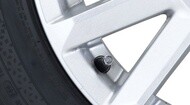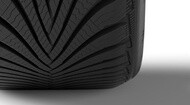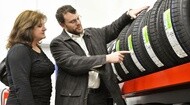
What are Michelin Run Flat Tyres?
What are run flats and who can use them?

What are run flats and who can use them?
Run flat tyres have specific technology to allow you to drive for a limited distance at a reduced speed after a puncture or a drop of tyre pressure. MICHELIN® Zero Pressure (ZP) tyres provide run-flat technology that allows you to drive up to 80 kms at 80 kph with a flat tyre.
No, only vehicles that originally were equipped with run flat tyres should mount them – these vehicles have some suspension and chassis modifications designed for run flat tyres.

Never mix run flat tyres with tyres that do not have run flat technology (conventional tyres) - unless in an emergency situation on a limited, temporary basis. The conventional tyre should be replaced with a run flat tyre as soon as possible.
Run flat tyres only allow you to drive for a limited distance and reduced speed after a puncture or other event has resulted in either a drop in tyre inflation pressure or a complete loss of inflation pressure. If you have MICHELIN® Zero Pressure (ZP) tyres, you can drive up to 50 miles at 50 mph with a flat tyre.

A tyre is low (or underinflated) when it doesn’t have sufficient air pressure to meet the vehicle manufacturer’s recommended psi (pressure per square inch). Underinflated tyres lead to flats and tyre blowouts.
Add air to your tyre until it reaches the proper air pressure (in psi, as measured by an air pressure gauge). To find the air pressure recommended for your tyre, consult your vehicle’s owner’s manual or find your recommended psi on the sticker on your door.
Never use tyres that have driven with very low pressure unless they have been thoroughly examined internally and externally by a tyre professional.
Internal damage is not visible while the tyre is mounted; only a professional can tell whether the tyre can be safely used again.
Take time to research. You can replace your original equipment tyres with the same tyre or another tyre that meets the original equipment specifications. See How to choose a tyre
When replacing two new tyres instead of four, be sure that your new tyres are the same size and tyre type as your current tyres, and that your dealer always installs the new tyres on the rear axle of your vehicle.

If tyres of different speed ratings are mounted on a vehicle, the lower speed-rated tyres should be placed on the front axle. This is to prevent a potential oversteer condition. Vehicle handling may be affected, and the vehicle’s speed capacity is now limited to the lowest speed-rated tyre.
If no instructions for tyre mixing appear in the vehicle owner’s manual, adhere to the following guidelines:
